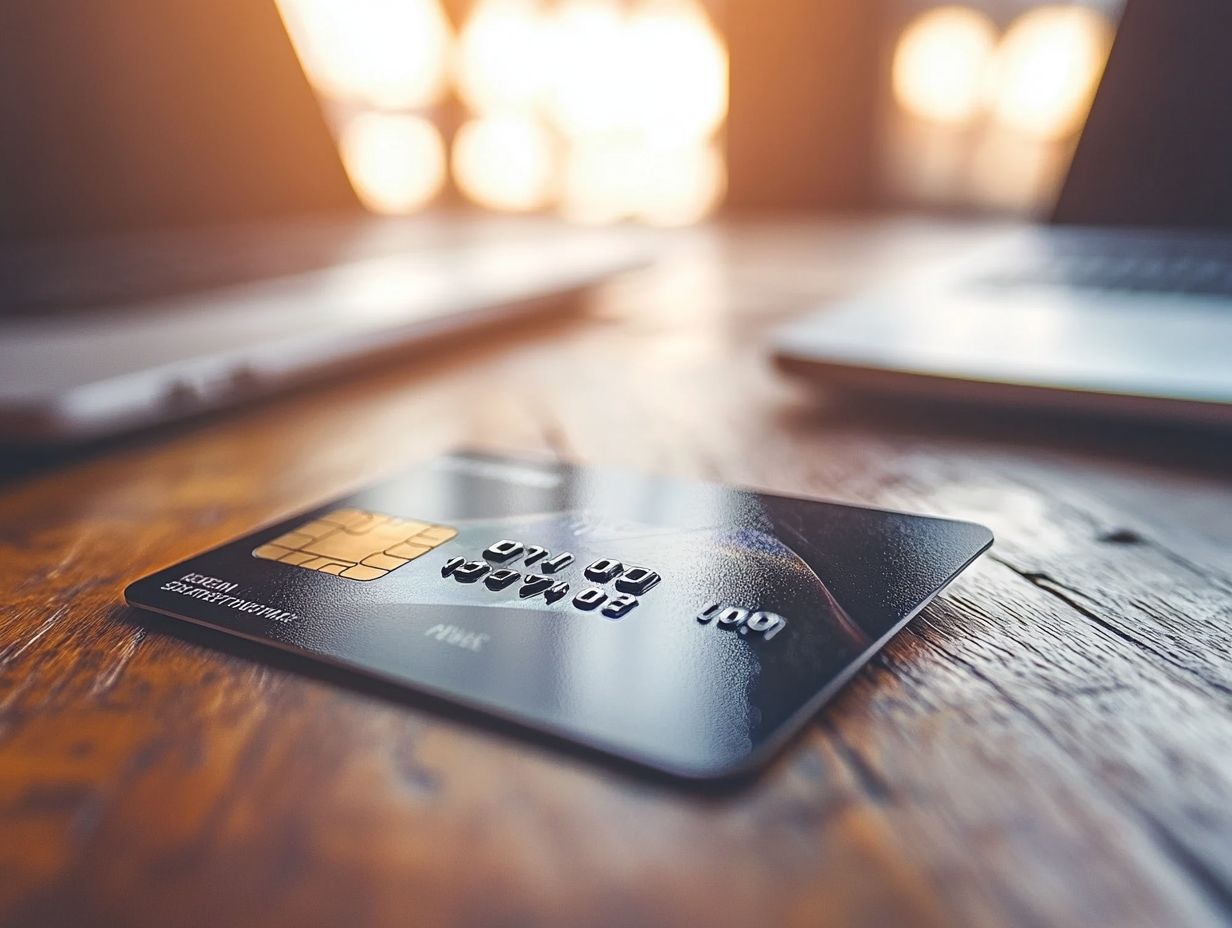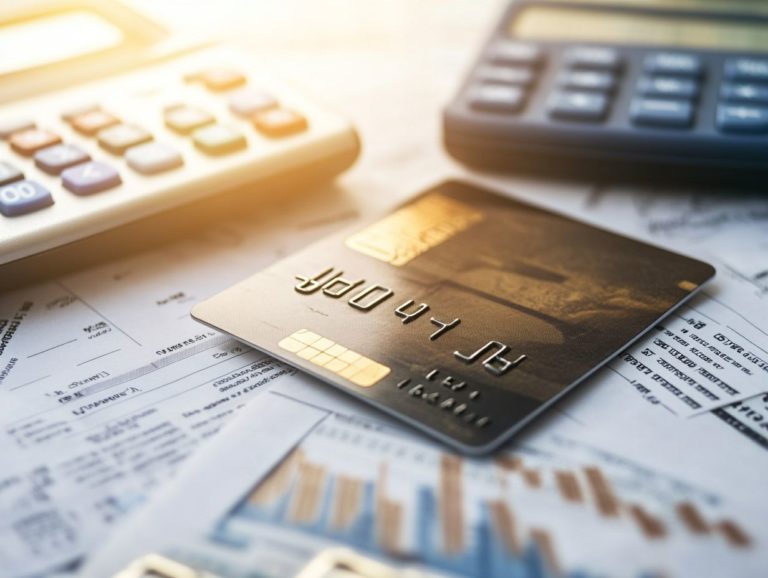The Importance of Credit Card Security Features
In today’s digital age, protecting your financial information is more crucial than ever. With credit card fraud on the rise, it’s essential to implement robust security measures that benefit both consumers and merchants.
This article delves into various security features designed to safeguard your credit card information, from EMV chip technology to biometric authentication. You’ll learn how these measures work to thwart fraud and protect your personal data, along with best practices for both cardholders and merchants.
It also explores emerging technologies that promise to elevate credit card security even more. Understanding the vital role these security features play in keeping your finances safe is absolutely essential.
Contents
- Key Takeaways:
- Understanding Credit Card Security
- Types of Credit Card Security Features
- How Credit Card Security Features Protect You
- Ensuring Credit Card Security
- Future of Credit Card Security
- Frequently Asked Questions
- What are the most important credit card security features?
- Why is it important to have EMV chip technology on credit cards?
- What is the purpose of CVV numbers on credit cards?
- How does tokenization protect credit card information?
- Why is it important to regularly monitor credit card transactions?
- What should I do if I suspect my credit card has been compromised?
Key Takeaways:

- Credit card security features such as EMV chips, CVV/CVC codes, tokenization, and biometric authentication provide strong protection against fraudulent transactions and safeguard personal information.
- By understanding and implementing best practices for credit card security, cardholders can play a crucial role in ensuring their own safety and preventing fraud.
- As technology continues to evolve, credit card security features will also advance to keep up with emerging trends and protect consumers from potential threats.
Understanding Credit Card Security
Understanding credit card security is essential in today s digital landscape. Online shopping reigns supreme and the threats of credit card fraud and identity theft are ever-present.
As financial institutions continuously enhance their security measures think EMV technology and tokenization you are equipped with tools designed to bolster your safety during transactions.
Companies like Mastercard and Fidelity are at the forefront, offering innovative solutions such as contactless cards and digital wallets. This ensures that your payments remain secure while significantly reducing the risks tied to unauthorized transactions.
Overview of Credit Card Fraud
Credit card fraud encompasses various illegal activities involving the unauthorized use of payment cards for purchases or fund access. This often results in identity theft and substantial financial loss.
This insidious practice manifests in various forms, one of the most common being phishing scams. Here, fraudsters cunningly entice individuals to divulge personal information through seemingly legitimate communications.
Such scams exploit weaknesses in online payment systems, placing both consumers and their financial institutions at considerable risk. Other tactics may include using stolen card information or counterfeit cards, underscoring the importance of maintaining robust security measures.
You should take advantage of the safety tools provided by your bank and remain vigilant in monitoring your accounts. Additionally, familiarize yourself with customer service contacts for swift assistance if you suspect any fraudulent activity.
Types of Credit Card Security Features
Credit card security features have undergone remarkable advancements to safeguard you from threats like credit card fraud and identity theft. By harnessing cutting-edge technologies such as EMV chip technology, tokenization (a method that replaces sensitive data with unique identification symbols), and biometric authentication, your safety is significantly enhanced.
These innovations create a secure environment for online shopping, offering robust fraud protection through multiple layers of security. You ll receive alerts for unauthorized transactions while your financial activities are continuously monitored, ensuring that your peace of mind remains intact.
Stay informed and protect your financial future today!
EMV Chip Technology
EMV chip technology marks a pivotal advancement in credit card security. It offers an encrypted solution that enhances the safety of your payment cards during transactions.
This technology uses advanced encryption to create a unique code for every purchase. This makes it nearly impossible for fraudsters to replicate your data. Unlike traditional magnetic stripe cards that store static information, EMV-enabled cards contain changing information that varies with each use. This evolution strengthens the security features of credit cards and boosts your confidence as a consumer.
The widespread adoption of EMV technology has led to a dramatic decrease in counterfeit fraud incidents. It provides a robust solution that protects both merchants and cardholders from financial losses.
CVV and CVC Codes

CVV and CVC codes are critical security features on credit cards. They provide you with an added layer of protection against unauthorized transactions, especially when you re online shopping.
These three or four-digit codes are usually found on the back or front of your card. They play a crucial role in secure payment processing. They ensure you physically possess the card while making a purchase, significantly reducing the risk of fraud during remote transactions.
By entering these codes, you not only verify your identity but also trigger transaction alerts that help you monitor any suspicious activities. This heightened focus on fraud protection is essential for both you and merchants. It creates a safer online shopping environment and fosters trust in the realm of digital commerce.
Tokenization
Tokenization is a revolutionary security feature that replaces your sensitive credit card information with unique identifiers. This ensures that your actual card details remain secure during online transactions.
This innovative approach reduces the risk of data breaches and enhances your user experience by facilitating seamless and secure payments through digital wallets and banking apps. By embracing this method, financial institutions protect your personal information against identity theft, making it significantly harder for cybercriminals to access your vital data.
As more banks and fintech companies adopt this technology, you can shop with peace of mind knowing your financial information is well protected. Tokenization is quickly becoming standard practice, reinforcing your trust in the rapidly evolving digital payment landscape.
Biometric Authentication
Biometric authentication harnesses unique physical traits, such as fingerprints or facial recognition. This delivers an elevated layer of security for your credit card transactions.
This cutting-edge approach safeguards your sensitive information and significantly diminishes the risk of fraudulent activities. As financial institutions increasingly embrace biometric solutions, they not only bolster their security measures but also cultivate greater trust among consumers.
When shopping online, you can enjoy heightened confidence, knowing that your personal data is protected by sophisticated technology. By seamlessly blending convenience with security, biometric authentication paves the way for a safer digital landscape, giving you the power to engage freely in e-commerce activities without the looming threat of identity theft or unauthorized use of your financial information.
How Credit Card Security Features Protect You
Credit card security features are essential for protecting you from fraudulent transactions and safeguarding your personal information. For more details on how to enhance your security, consider understanding credit card fraud protection. They enable a secure online shopping experience and help build trust between you and financial institutions.
With these robust measures in place, you can shop with confidence, knowing that your data is well protected.
Preventing Fraudulent Transactions
Preventing fraudulent transactions is at the forefront of credit card security features. You can rely on tools like transaction alerts and real-time monitoring to swiftly detect and thwart unauthorized access.
Beyond these fundamental methods, organizations are increasingly embracing advanced technologies. Biometric authentication leverages unique physical attributes like your fingerprints or facial recognition to verify your identity.
Fraud alerts act as proactive notifications, enabling you to quickly identify and respond to any suspicious activities. This adds an extra layer of security to your transactions.
Computer programs that learn from data help analyze spending patterns, enhancing the ability to differentiate between legitimate transactions and potential fraud. This ultimately fosters a safer financial environment for you as a consumer.
Protecting Personal Information

Protecting your personal information is absolutely crucial in today s digital landscape, where the threat of identity theft looms large. Credit card security features are expertly crafted to combat these risks.
To ensure your safety, many banking apps harness advanced security measures like encryption and tokenization. Encryption transforms your sensitive data into an unreadable code, only decipherable with a specific key. This means that even if someone intercepts the data, it remains a mystery to unauthorized eyes.
Tokenization replaces sensitive information with unique identifiers tokens that facilitate transactions without revealing the actual data.
Together, these methods form a formidable defense against potential breaches, giving you the power to manage your finances with confidence and security.
Ensuring Credit Card Security
Ensuring credit card security demands a steadfast commitment from you, as both a consumer and a merchant. By adhering to best practices and implementing timely security updates, you play a crucial role in cultivating a safer ecosystem for online transactions.
Your diligence not only protects your interests but also fortifies the trust that underpins the digital marketplace.
Best Practices for Cardholders
- Regularly monitor your transactions.
- Set up fraud protection alerts.
- Utilize banking apps to streamline tracking your spending.
- Keep security updates for your mobile devices and apps current.
- If you detect any unusual transactions, contact customer service for assistance.
- Consider enabling two-factor authentication for added protection.
This ensures that even if your card is compromised, unauthorized access remains limited.
Merchant Responsibilities
Merchants play a crucial role in ensuring credit card security, taking on the responsibility of implementing robust security features and safeguarding payment card information.
To meet this important obligation, you must stay current with the latest security standards and best practices recommended by financial institutions. This involves employing advanced fraud alerts and leveraging digital wallets, which enhance encryption and minimize the risk of sensitive data being compromised.
It s vital for your business to train staff in recognizing potential security threats and addressing any issues that may arise promptly. By fostering a culture of proactive security, you can significantly reduce the likelihood of data breaches, maintain customer trust, and ensure compliance with regulatory requirements.
Future of Credit Card Security
The future of credit card security shines brilliantly. Cutting-edge technologies like biometric authentication and contactless payments are transforming the landscape. These advancements not only bolster protection against fraud but also significantly enhance consumer trust in the payment process.
Act now to protect your personal information! The digital landscape is evolving, and so are the threats.
Emerging Technologies and Trends

Emerging technologies, such as biometric authentication and advanced encryption techniques, are redefining credit card security. These innovations offer enhanced protection against fraud.
They work hand-in-hand with sophisticated fraud protection strategies, allowing you to secure your digital wallet with unprecedented confidence. As more individuals embrace mobile payments, integrating technologies like artificial intelligence in transaction monitoring is imperative.
This not only aids in identifying suspicious activities in real-time but also gives the power to businesses to respond swiftly to potential threats.
The shift towards contactless payments is amplifying the demand for robust security measures. This ensures you can transact without worrying about your personal data being compromised.
This evolving security landscape is reshaping how financial transactions are conducted in our digital age.
Frequently Asked Questions
Have questions about credit card security? Here are some answers!
What are the most important credit card security features?
The most important credit card security features include EMV chip technology, CVV numbers, and tokenization. Understanding why credit card features matter for your wallet can help protect against fraud and unauthorized use of your credit card.
Why is it important to have EMV chip technology on credit cards?
EMV chip technology is important because it creates a unique code for each transaction. This makes it more difficult for hackers to steal and use your credit card information.
What is the purpose of CVV numbers on credit cards?
CVV numbers, or Card Verification Value numbers, are used as an additional security measure. They verify that the person making the purchase has physical possession of the credit card.
How does tokenization protect credit card information?
Tokenization is a method that replaces sensitive credit card information with a unique identifier, called a token. This helps prevent fraudsters from accessing and using your credit card information.
Why is it important to regularly monitor credit card transactions?
Regularly monitoring your credit card transactions allows you to quickly identify unauthorized charges or suspicious activity. Prompt reporting can prevent further fraud or identity theft.
What should I do if I suspect my credit card has been compromised?
If you suspect that your credit card has been compromised, contact your credit card company immediately. Report any unauthorized charges and consider placing a fraud alert on your credit report. Monitor your accounts closely for any suspicious activity.
Stay informed and protect your finances learn more about these technologies today!






